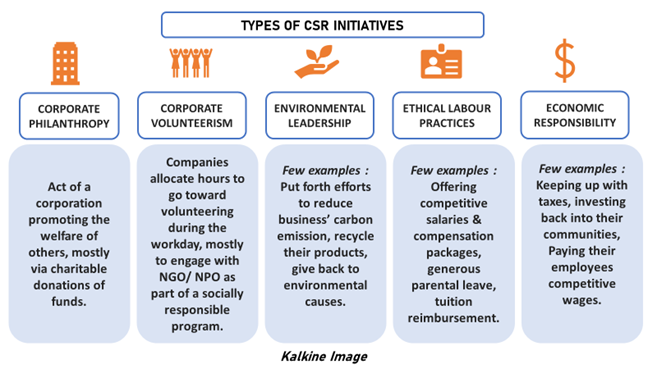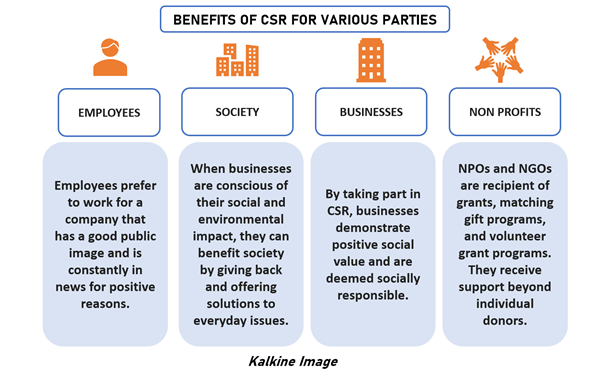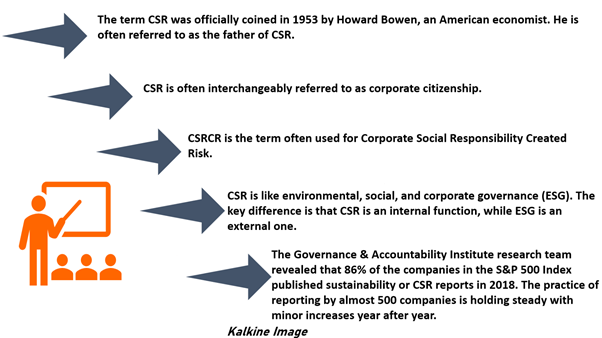Definition
Related Definitions
Corporate Social Responsibility (CSR)

What Is Corporate Social Responsibility (CSR)?
Corporate social responsibility (CSR) is a form of global private business self-regulation. Simply put, CSR is the way to incorporate social and environmental concerns into the company’s planning and operations. Breaking this down even further, CSR is any effort that seeks to improve the company's social and environmental impact via ethical and moral actions.
CSR includes several practices that are put in place by the companies to uphold the principles of sustainable development. These principles suggest that the company is expected to be economically feasible, have a positive impact on society, and respect and preserve the environment.

CSR is often undertaken as a key brand-building drive. In modern times, it is embedded as a key component of advertisement and marketing initiatives. Undertaking social activities and promoting the same plays a crucial role in brand awareness.

A Harvard Business Review reports states that the main goal of CSR is “to align a company’s social and environmental activities with its business purpose and values.”
How Do We Map the Evolution Of CSR?
CSR models have existed since time immemorial. For instance, Andrew Carnegie challenged the rich to support social causes way back in the 1800s.
In the early 1900s, Frederick Goff founded the Cleveland Foundation to exclusively give power to the community by accepting gifts from multiple donors rather than one fortune. They could together assess needs and respond to the community.
As a concept, the evolution of CSR dates back to the 1950’s. This was the period when the initial stirs of social conscience amid management theorists and practitioners were acknowledged and felt. For instance, Keith Davis has been known to initiate CSR discussions and the need for businesses to engage in socially responsible behaviour.
Some experts suggest that CSR was taken seriously in 1970s, as a concept. This was the period when big businesses and their minions were accused of several misdemeanors that hampered environment and society as a whole.
The 1990s saw the initial acceptance of CSR. By the early 2000s, CSR had become an important strategy for many organizations. Multi-million-dollar companies like Wells Fargo, Coca-Cola, Walt Disney, and Pfizer were one of the firsts that endorsed this concept into their businesses processes, during this period.
What are Some of the Common CSR Initiatives?
As deciphered, the main purpose of CSR is to give back to the community, provide positive social value and take part in philanthropic causes. Contemporary businesses of today are progressively turning to CSR to develop a positive brand around their company and make a difference.
Below are a few ways in which businesses choose to participate in CSR-

What Is the Importance Of CSR?
In a nutshell, what the public thinks of a company and its brand is critical to its success. Customers tend to be associated more with the products and offerings of the company with key CSR initiatives, thereby strengthening brand loyalty.
CSR is not a mandated practice in most countries of the world. However, it is extremely important as something extra that companies do to improve their local and global communities. CSR programs believe that businesses have the potential to make the world a much better place. At the very least, CSR programs can reduce the negative social and environmental footprint of the company in the world.
CSR does influence the employees, stakeholders and consumers when zeroing in a brand or company.
According to UNIDO, a judiciously implemented CSR concept can bring along a variety of competitive advantages-
- Enhanced access to capital and markets.
- Increased sales and profits.
- Operational cost savings.
- Improved productivity and quality.
- Efficient human resource base.
- Improved brand image and reputation.
- Enhanced customer loyalty.
- Better decision-making ability
- Streamlined risk management processes.
Furthermore, sustainable development can help a business financially. Consider this- how huge could the impact on production costs be if a business used less packaging and less energy- a lot!
How Does CSR Help the Parties Involved in Businesses?
CSR impacts companies, nonprofits, and employees alike. Let us cast an eye on how CSR benefits the different parties involved in the business-

Are There Any Risks Associated with CSR?
Business experts opine that in addition to several celebrated possible benefits, CSR also creates risk. Some of them are highlighted below-
- Insincere CSR like greenwashing can damage a firm’s reputation.
- CSR initiatives can often turn out to be costly affairs.
- Businesses can indulge their interests with shareholders’ profits, an agency cost.
- Bureaucracy created by CSR can weigh down Business operations.
- CSR can offend some consumers. For instance, after Chiquita avoided Canadian oil, many Canadians boycotted Chiquita’s products.
- Governments can respond to self-regulation of CSR by levying tight regulations.
Do You Know These Interesting Facts About CSR?

ALSO READ: How ESG Consideration Rings Bell In Assessing The Quality of A Mining Stock?
Are You Aware of These Prominent Examples Of CSR?
- With $100 million in funding for the period 2010 to 2015, the large mid-western bank PNC’s Grow Up Great initiative provides school-readiness resources to underserved populations where the bank operates.
- In Mexico, Bimbo is the leading bakery. It has a workforce of ~ 100,000 with a likewise number of retailers. Its CSR programs focus on social welfare: free education facilities to support employees’ complete high school, additional financial assistance and medical care for dependents’.
- Ambuja Cements is an Indian subsidiary of the Swiss conglomerate Holcim. Its CSR initiatives encompass social welfare efforts and environmental conservation and protection programs- improved water management, plant-level environmental sustainability programs.
- IKEA’s People & Planet initiative calls for the entire supply chain to be 100% sustainable by 2020.
- Starbucks has achieved several CSR milestones- reaching 99% of ethically sourced coffee, creating a global network of farmers, pioneering green building across stores, hours of community service, creating a revolutionary college program for its partner/employees.
